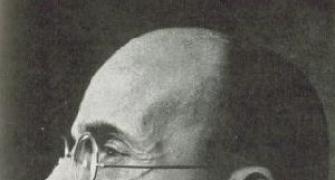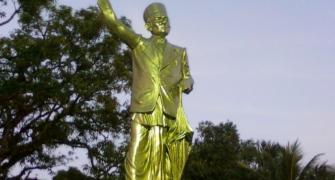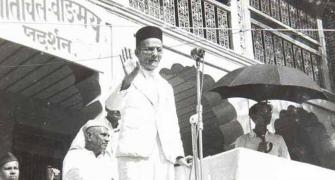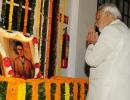'I owe it to Veer Savarkar, to his spirit, to his legacy and to his untold story so that I tell it well and it reaches people, and people absorb it and feel what he went through and all the sacrifices that he made, which have been brushed under the carpet.'

More than 50 years after his death, Vinayak Damodar 'Veer' Savarkar remains relevant today, and perhaps that's why Randeep Hooda has taken it up himself to make a film on the freedom fighter.
Hooda plays Savarkar, and the film, Swatantrya Veer Savarkar, also marks his directorial debut.
"It is an anti-propaganda film. The film will clear all the propaganda against Veer Savarkar that has been going on for so many years," Hooda says, adding, "I want this film to be translated in every language so that the story of Veer Savarkar reaches very corner of the world. It will show the world the horrors of colonialism that we went through, which was missing in Richard Attenborough's Gandhi."
Hitesh Harisinghani/Rediff.com and Afsar Dayatar/Rediff.com bring back interesting moments from the trailer launch.

"India is armed and respected in the world, and there is peace because we are armed. That was Mr Savarkar's philosophy," Hooda says.
He explains why he believes Savarkar remains relevant today in this video.

Could India have got freedom earlier had we had followed Savarkar?
Yes, Hooda says, and gives a quick history lesson.
"When Savarkar was sent to prison, the momentum of his armed movement was lost and then the non-violent movement started, which was conducive to the British. Ultimately, they left because they had lost too much money in the first World War."
Mahatma Gandhi's assassination, Hooda adds, has also been dealt with in this film, and what Savarkar's alleged role in it was.

Savarkar was not a 'maafiveer', and Hooda claims he has addressed all the controversies in Savarkar's life.

Hooda is known to transform completely into the characters he plays, when they are based on real life people like Sarabjit Singh (Sarbjit, 2016) or Charles Sobhraj (Main Aur Charles, 2015). How did he transform into Savarkar here?
"I lost 30-32 kilos for this film, so it was more than Sarbjit. But I felt that if a person is locked up in Kala Pani (jail in Port Blair in the Andamans) for so long with meager food and very bad conditions, there would have been an extreme weight loss, and Savarkarji had jaundice many times when he was there," Hooda says.

Will the movie spark Savarkar versus Congress debates?
"The movie is about the armed revolution, and the Congress, except for Lokmanya Tilak, was a pacifist organisation. And it's true that no Congress member was ever sent to Kala Pani (jail). Why would that be? That's a question I'm asking the audience," Hooda says.










